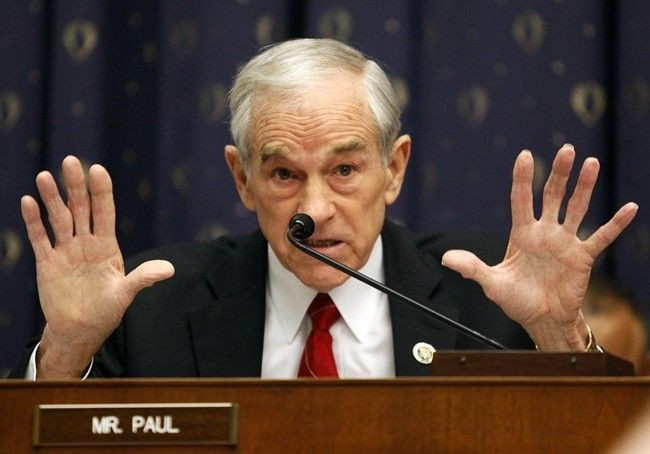Economists encourage, attack Fed in Paul panel

Economists took their turns encouraging and attacking the policies of money supply managers of the U.S. Federal Reserve System on Wednesday, as the nation faces 9 percent unemployment, slow economic growth and rising federal debt and deficits.
Rep. Ron Paul, the Chair of Domestic Monetary Policy and Technology subcommittee in the House Committee on Financial Services has been a long-time critic of the Fed. He has previously called for legislation to authorize the first-ever audit of the institution to allow for more transparency in its operations.
The proposal has met with resistance by Fed Chief Ben Bernanke who said in a rare question and answer session last week that the central bank's decision-making should be independent of short-term political considerations that would eventually lead to a Congressional evaluation about whether the Fed was making the right decisions. He called the system's independence a fundamental bedrock principal of central banking.
Wednesday's hearing was entitled Can Monetary Policy Create Jobs?
The Fed - whose decision-making board of seven members has been appointed by U.S. presidents and confirmed by the Senate over the years - has bought $2.3 trillion in assets from banks and other financial institutions over the past three years. The policy, known as quantitative easing, has made purchases of U.S. Treasuries and mortgage backed securities in two rounds so far - soon after the latest financial crisis began, and late last year.
The Fed has also kept an overnight bank-lending rate called the federal-funds rate at record lows near zero for banks for the past two years, letting them borrow money at low cost with the expectation that low borrowing costs will help more money flow through the economy.
At a separate hearing on Wednesday, Bernanke told lawmakers of the House Budget Committee that while there had been some increases in highly visible prices such as gasoline, industrial and agricultural commodities overall inflation is still quite low and longer-term inflation expectations have remained stable.
A wide range of market indicators suggest that the Federal Reserve's securities purchases have been effective at easing financial conditions, lending credence to the view that these actions are providing significant support to job creation and economic growth, Bernanke said.
More Fed Support Needed
The Federal Reserve has not done enough so far but it is on the right track to help reduce unemployment, which stands at 9 percent this month and is expected to rise briefly before reaching pre-recession levels sometime in 2015, said Josh Bivens, an economist at the Economic Policy Institute in Washington.
[T]he Fed should remain very aggressive in its policy stance: keeping policy-rates low, following through with the full round of QE2 and preferably engaging in more asset purchases after the initial $600 billion is exhausted, he told lawmakers on Wednesday.
Bivens cited research saying that the Fed's large scale asset purchases probably supported 3 million jobs and will have lowered measured unemployment by 1.5 percentage points through the end of 2012.
Bivens said the Federal Reserve could not help bring about a full economic recovery on its own. He said it needed help from the federal government, which would need to spend more money to create jobs.
If, for example, Congress acted to provide a new, significant round of effective fiscal support to the economy, the Fed could act to enhance the effectiveness of this support as well as keeping it from adding to the national debt held by the public by simply buying the new debt issues and holding them on its balance sheet.
Unless more support is forthcoming from other levers of macroeconomic stabilization, [the Fed's] ability to do much more than continue its current stance is limited, Stevens said.
Federal debt, Fed policies threaten Inflation later
Richard Vedder, an professor of economy at Ohio University, told lawmakers that despite huge federal exertions on both the fiscal and monetary side, we have the weakest recovery going on now in the lifetimes of most persons in this room.
He also warned of higher prices of goods and services if government and Fed policies continued.
[T]he huge run-up in the ratio of federal debt to output will be a significant drag on the economy for many years, and may well lead the Fed to monetize debt, unleashing a wave of inflation that can only undermine our economy, Vedder said.
Far from providing stimulus, the combined easy money monetary policy and wildly expansionist fiscal policy scared the heck out of business persons and investors, Vedders said.
The Fed and the government have monetary and fiscal time bombs threatening both short term recovery and long term financial and economic vitality, he added.
Fed as job creator and destroyer in boom-bust cycle
Thomas Di Lorenzo, a professor of economics at Loyola University Maryland said that monetary policy under the direction of the Federal Reserve has a history of creating and destroying jobs since its inception in 1914.
It was the excessively expansionary monetary policy of the Fed - and of other central banks - that caused yet another boom- and-bust cycle that spawned the Great Depression, he said.
The Fed was not only responsible for causing the massive unemployment that we endure today, but also a great amount of what economists call mismatch unemployment, he said.
The skills that people in these industries (housing and construction) developed were no longer in demand; they lost their jobs; and now they must retool and re-educate themselves.
In summary, the Fed's monetary policies tend to create temporary and unsustainable increases in employment while being the very engine of recession and depression that creates a much greater degree of job destruction and unemployment.
© Copyright IBTimes 2025. All rights reserved.




















